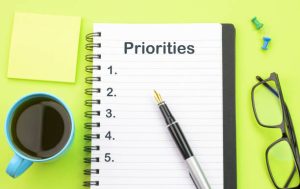
Leaving work early
Work-life balance is an essential aspect of modern-day life. In today’s fast-paced world, employees face many demands that make it challenging to balance work and personal life. One way to achieve work-life balance is to leave work early. Leaving work early can provide employees with the opportunity to prioritize their personal life and reduce stress. This article will provide a guide for employees on how to leave work early while ensuring that their work is still completed to a high standard.
Many time related issues end up at the Fair work Commission around the issues of abandonment of employment. The purpose of this article is to avoid this scenario.
Plan Your Day
Planning your day is essential when it comes to leaving work early. Start by setting clear goals and priorities for the day. Identify the tasks that are most important and allocate your time accordingly. You should also consider delegating tasks to other team members if possible. By doing this, you can ensure that you are using your time effectively and avoid having to work overtime.
Communicate with Your Manager
Communication with your manager is key when it comes to leaving work early. You should inform your manager of your plans to leave early in advance. Don’t leave it to the last moment. Try to ensure that you have completed all the necessary tasks before you leave. You should also make sure that your manager is aware of any outstanding issues that need to be addressed before you leave.
Manage Your Time Efficiently
Managing your time efficiently is essential when it comes to leaving work early. One way to do this is by eliminating distractions and focusing on the task at hand. You might also try using time management tools like calendars and to-do lists to assist you in maintaining your organization and staying on track with your goals.
Take Breaks
Taking breaks is an important aspect of managing your time efficiently. It’s easy to become overwhelmed and stressed when working for long periods without a break. Taking a break can help you recharge and increase your productivity. It’s recommended that you take a break every 90 minutes to ensure that you remain focused and energized.

Be Proactive
When it comes to getting out of work early, being proactive is really necessary. You should be proactive in recognizing and addressing possible problems before they become major difficulties. You should do this before they become an issue. This can include addressing conflicts with colleagues or finding ways to streamline processes to increase efficiency. By being proactive, you can reduce the likelihood of having to work overtime to address issues that could have been prevented.
Leaving work early is an excellent way for employees to achieve work-life balance. By following the steps outlined in this guide, employees can leave work early while ensuring that their work is still completed to a high standard. It’s essential to plan your day, communicate with your manager, manage your time efficiently, take breaks, and be proactive. By doing so, you can enjoy a better work-life balance and reduce stress in your personal and professional life.
Evaluate Your Workload
Evaluating your workload is essential to leaving work early. You should assess the tasks that are most critical and prioritize them accordingly. Identify any tasks that can wait until the following day and focus on completing the most important ones. You can also consider delegating tasks to other team members if necessary.
Create Boundaries
Establishing precise boundaries is a crucial step in achieving a healthy work-life balance. Establish distinct limits between your job life and your personal life, and try not to overwork yourself. You can consider setting a specific time to leave work every day and avoid checking emails or taking work-related calls outside of work hours. By doing so, you can ensure that you have time to focus on personal activities and hobbies that help you relax and recharge.
Utilize Technology
Utilizing technology can help you save time and leave work early. Consider using tools such as project management software, email filters, and automation tools to streamline processes and increase efficiency. By doing so, you can complete tasks faster and reduce the likelihood of having to work overtime. ChatGPT is increasingly being utilized.

Take Responsibility for Your Time
Taking responsibility for your time is essential when it comes to leaving work early. Don’t rely on excuses to get out of work. You should avoid procrastination and prioritize your tasks according to their importance. If you find that you’re struggling to complete tasks on time, you can consider taking a time management course or seeking advice from a mentor. By taking responsibility for your time, you can increase your productivity and reduce the likelihood of having to work overtime.
Discuss Flexible Working Arrangements
If you find that leaving work early is not feasible due to your workload, you can consider discussing flexible working arrangements with your employer. This can include working from home or adjusting your working hours to accommodate personal commitments. By discussing flexible working arrangements with your employer, you can achieve a better work-life balance and reduce stress in your personal life.
- Leaving work early can help employees achieve work-life balance and reduce stress.
2. By planning your day, communicating with your manager, managing your time efficiently.
3. Taking breaks, being proactive, evaluating your workload, creating boundaries, utilizing technology, taking responsibility for your time.
4. Discussing flexible working arrangements,
You can leave work early while still ensuring that your work is completed to a high standard. In order to strike a healthy balance between your professional and personal lives, it is important to make your personal life a top priority and to draw distinct lines between your professional and personal obligations.
Delegate Tasks
Delegating tasks can help employees leave work early. As an employee, you should learn to delegate tasks to other team members who may be better equipped to handle them. This will not only help reduce your workload, but it will also ensure that tasks are completed to a high standard. Task delegation can also help team members grow their skills and abilities. This will in turn makes it possible for them to take on additional duties in the future.
Manage Distractions to be able to leave work early
Managing distractions is important when it comes to leaving work early. As an employee, you should be able to identify the things that distract you from completing your tasks on time and finding ways to minimize them. This can involve avoiding personal conversations or social media during work hours. Finding a quiet space to work, or utilizing headphones with noise cancellation technology to shut out noise from the outside world. There has to be some “give and take” in the arrangement.

Take Regular Breaks
Taking regular breaks is important for productivity and mental well-being. If you want to avoid burnout and boost your level of productivity, one of the best things you can do as an employee is to make sure you take breaks on a regular basis. This can include taking short breaks to stretch or walk around, having a quick chat with a colleague, or taking a lunch break away from your desk.
Use Time-Blocking
The method of time management known as time blocking includes assigning certain chores to occur at predetermined intervals throughout the day. As an employee, you can use time-blocking to manage your workload and ensure that you leave work early. This involves breaking down your day into blocks of time for specific tasks, such as checking emails, completing urgent tasks, and attending meetings. By doing so, you can prioritize your tasks and reduce the likelihood of having to work overtime. Avoid excuses to get out of work early.
Manage Expectations
Managing expectations is important when it comes to leaving work early. As an employee, you should communicate clearly with your manager and colleagues about your workload and availability. This can involve setting realistic deadlines for tasks. Also communicating any potential delays or issues, and ensuring that your manager is aware of your progress. By managing expectations, you can ensure that your workload is manageable and that you can leave work early without compromising on quality.
Leaving work early is important for achieving work-life balance and reducing stress. By delegating tasks, managing distractions, taking regular breaks, using time-blocking, and managing expectations, employees can leave work early while still ensuring that their work is completed to a high standard. In order to maintain a healthy work-life balance, it is essential to give personal time a higher priority and to draw distinct lines between one’s professional and personal obligations.
Use Automation and Technology
Automation and technology can help employees leave work early by simplifying and streamlining work processes. As an employee, you can use software and tools to automate repetitive tasks, such as scheduling social media posts or email responses. This will free up time and allow you to focus on more important tasks that require your attention. Additionally, you can use project management software or collaboration tools to keep track of tasks, deadlines, and progress, reducing the need for long hours spent catching up on work.

Set Boundaries and Say “No”
Setting boundaries and saying “no” is an important aspect of leaving work early. As an employee, you should learn to set realistic boundaries and prioritize your workload to avoid taking on too much work. This involves learning to say “no” to requests that are beyond your capacity or outside of your job description. Additionally, setting clear boundaries around your work hours and availability will help you communicate your needs and expectations to your colleagues and managers, reducing the likelihood of being asked to work outside of regular hours.
Invest in Self-Care
Investing in self-care is crucial for maintaining a healthy work-life balance. As an employee, you have a responsibility to make taking care of your physical and mental health a top priority by participating in activities that enhance well-being, such as physical activity, meditation, or hobbies. This will help reduce stress and improve your overall productivity, allowing you to leave work early without feeling guilty or overwhelmed.
Plan and Prioritize leaving work early
Planning and prioritizing your workload is an essential aspect of leaving work early. As an employee, you should learn to plan your tasks and prioritize them based on their importance and urgency. This involves creating a to-do list or schedule for the day, setting realistic deadlines, and breaking down large tasks into smaller, manageable ones. By planning and prioritizing your workload, you can avoid feeling overwhelmed or rushed, which can lead to working late hours.

Communicate with Your Manager
Effective communication with your manager is crucial for leaving work early. As an employee, you should maintain open and honest communication with your manager regarding your workload, progress, and availability. This involves updating your manager regularly on your tasks, seeking feedback, and asking for help or support when needed. Additionally, you can discuss flexible work arrangements, such as working from home or adjusting your work hours, with your manager to ensure that your work-life balance is maintained.
In order to maintain a healthy work-life balance, leaving work early is crucial. Employees can leave work early without sacrificing quality or productivity if they make use of automation and technology, establish clear boundaries and learn to say “no,” invest in self-care, plan ahead, and communicate with their managers. In order to avoid burnout and ensure that one’s emotional and physical health are not compromised, it is vital to make personal time and self-care a priority.
Leaving work early final comment
To recap for employees on how to leave work early, quitting your job early could be a challenging undertaking, but if you thoughtfully plan for it and communicate with your coworkers, the transition will go down without a hitch, and you will be able to go out on good terms with your employer. You should determine the priorities for your job, investigate the many ways in which tasks could be distributed, and keep an open line of communication with the manager who reports directly to you as well as with the other staff members working for your organization at all times.
If you pay attention to these tips and put them into action, you will be able to leave work early without causing any issues or other adverse repercussions for yourself. Hopefully you will be able to save time and money. If you follow these procedures for employees on how to leave work early, you will be able to save both time and money in the process.
If you have been dismissed, facing dismissal or a workplace investigation give us a call. All casual or employee rights, make the call, we here to help you. We are Australia’s leading workplace advisors and commentators. We are proud of our staff and the outcomes they get for our clients.
Call 1800 333 666 for prompt confidential advice.






